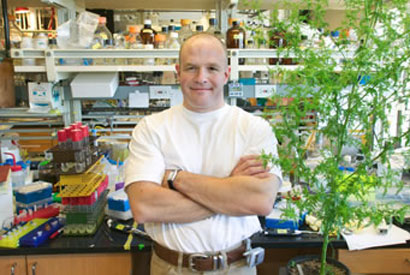On Capitol Hill, Keasling calls for ‘national initiative’ to boost bioengineering
UC Berkeley professor and synthetic-biology pioneer Jay Keasling was on Capitol Hill Thursday, stressing the need for a federal strategy to ensure continued U.S. leadership in a field he said can yield significant medical benefits for people throughout the world, “and even save lives.”

July 21, 2014
UC Berkeley professor and synthetic-biology pioneer Jay Keasling was on Capitol Hill Thursday, stressing the need for a federal strategy to ensure continued U.S. leadership in a field he said can yield significant medical benefits for people throughout the world, “and even save lives.”

Keasling, right, chats with San Diego Rep. Scott Peters, who serves on the Science, Space and Technology Committee. (Photo by Michelle Moskowitz)
Keasling, a professor of chemical and biomolecular engineering and of bioengineering and senior faculty scientist at Lawrence Berkeley National Laboratory, led a team of scientists in engineering a microbial production process for artemisinin, an effective — but, in many parts of the world, prohibitively expensive — therapy for malaria. The disease takes nearly a million lives each year, mostly children under the age of 5. His team’s synthetic-biology process has been licensed to Sanofi-Aventis, which has scaled the process to industrial levels and is on track, he said, to meet roughly half the world’s need for the drug by next year.
Keasling — who also serves as director of the National Science Foundation-funded Synthetic Biology Engineering Research Center, and as CEO of the Energy Department-funded Joint BioEnergy Institute — appeared at a subcommittee hearing of the House Committee on Science, Space and Technology. The session, titled “Policies to Spur Innovative Medical Breakthroughs From Laboratories to Patients,” invited experts to speak on the need for both private and public investments in biomedical-science research and development.
Keasling called for “a national infrastructure that continues to support collaboration, constructive competition and the production of tools and knowledge needed to responsibly and productively harness the capabilities of engineering biology.” The federal government’s support for these “foundational tools and technologies,” he said, is “the real key to U.S. competitiveness.”